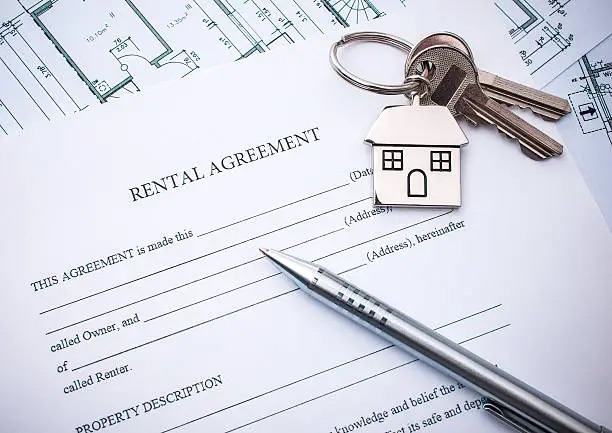The continued rise in the cost of living leaves many of us worried about how we’d afford a sudden rent increase.
However, your landlord can’t increase your rent whenever they like. They also can’t raise your rent by any amount. Your landlord must follow specific rules if they want to charge you more. These rules depend on what type of tenancy you have.
Understanding your tenancy agreement, which should detail how and when the landlord will review your rent, is crucial.
Specific rules exist to protect you from arbitrary rent increases, especially for regulated tenancies.
When your landlord can increase rent
For a periodic tenancy (rolling weekly or monthly), your landlord can only typically increase the rent once a year with your agreement.
Your landlord can only increase the rent for a fixed-term tenancy (running for a set period) with your agreement. If you disagree, your landlord can only increase your rent when the fixed term ends.
General rules around rent increases for all tenancies
- your landlord must get your permission if they want to increase the rent by more than you previously agreed
- the rent increase must be fair, realistic, and comparable with average rents in your area


How your landlord must propose a rent increase
If your tenancy agreement sets out a rent increase procedure, your landlord must stick to it.
However, if there’s no procedure in your tenancy agreement, your landlord can:
- renew your tenancy agreement at the end of the fixed term, but increase your rent
- agree a rent increase with you and put together a written record of the agreement for you both to sign
- use a ‘Landlord’s notice proposing a new rent’ form to increase the rent after the end of the fixed term
Your landlord must give you at least one month’s notice (if you pay weekly or monthly rent). They must give you six months’ notice if you have a yearly tenancy.
If you disagree with your rent increase, you should talk to your landlord to agree to pay lower rent.
Ask your landlord if you can pay less than they’re proposing. For example, if your landlord wants to increase your rent from £850 to £900 per month, suggest splitting the difference and paying £875.
Your landlord may be willing to negotiate rather than risk losing you as a tenant.
Review the rent for similar properties in your area before reaching an agreement. Use this comparison to explain why your landlord shouldn’t increase your rent.
Working out what you can afford before entering negotiations would be best.


Rent review clauses
If you have a rent review clause, your landlord can usually increase your rent at specific times during the fixed term of your tenancy without giving you a Section 13 notice.
Without a rent review clause, your landlord must give you a valid Section 13 notice before increasing your rent. However, you can challenge your rent increase even if the Section 13 notice is valid.
Your section 13 notice might be invalid if:
- your landlord hasn’t given you the correct notice for the rent increase – this will depend on your tenancy, but it must be at least a month’s notice
- there’s a mistake on it, for example, the wrong name or address
- your landlord wants to increase your rent during a fixed-term tenancy
- your landlord hasn’t signed the notice
- your landlord hasn’t used the correct form – you can see an example of Form 4 here
You can challenge your rent increase if you’ve got a section 13 notice and:
- the increase is unreasonable – for example, if your home’s in bad condition because your landlord is not carrying out repairs
- you haven’t yet paid the increased amount
Remember, seeking legal advice before your rent increase starts can provide you with the necessary guidance and support. This is particularly important as paying the new rent could be seen as an acceptance of the increased rate, limiting your ability to challenge it.

What if I get Housing Benefits?
You might be able to get extra money to deal with your rent increase if you get Housing Benefit or housing costs payments through Universal Credit. Inform the council’s housing team about the increase before it starts and send evidence, such as a letter from your landlord.
Check your tenancy agreement
Your landlord will usually give you an ‘assured shorthold tenancy’. They can increase your rent regularly with this type of tenancy. However, not all landlords will do this every year.
Click here to check what type of tenancy you have.

If you can’t reach an agreement with your landlord
If you decide the rent increase is reasonable but too high for you, consider your options before deciding to move out.
Check if you can get help to pay your rent. If you’re on a low income or receive benefits, you might be able to get Housing Benefit (or housing costs payments through Universal Credit).
If you decide to move out, make sure you’ve found a new place to live before leaving. You might not be able to get help from your local council if you leave a home you could have afforded.

Challenging your rent increase
If your landlord doesn’t agree to a lower rent, you can appeal to a tribunal for rent complaints for free.
You must pay your current rent even if you challenge the increase to avoid arrears. Your landlord can try to evict you if you get into rent arrears. Some landlords might make it difficult and try to make you leave the property, so get advice before challenging your rent increase.
But don’t worry – they can’t evict you immediately. Unless you live with them, your landlord has to follow an eviction process that involves giving you written notice to leave the property before getting a court order.

Your landlord can evict you more quickly if you live with them by giving you reasonable notice to leave, which could be as little as a few weeks.
Get advice before deciding not to pay your rent increase. It’s essential to get help early so you can avoid getting evicted.
